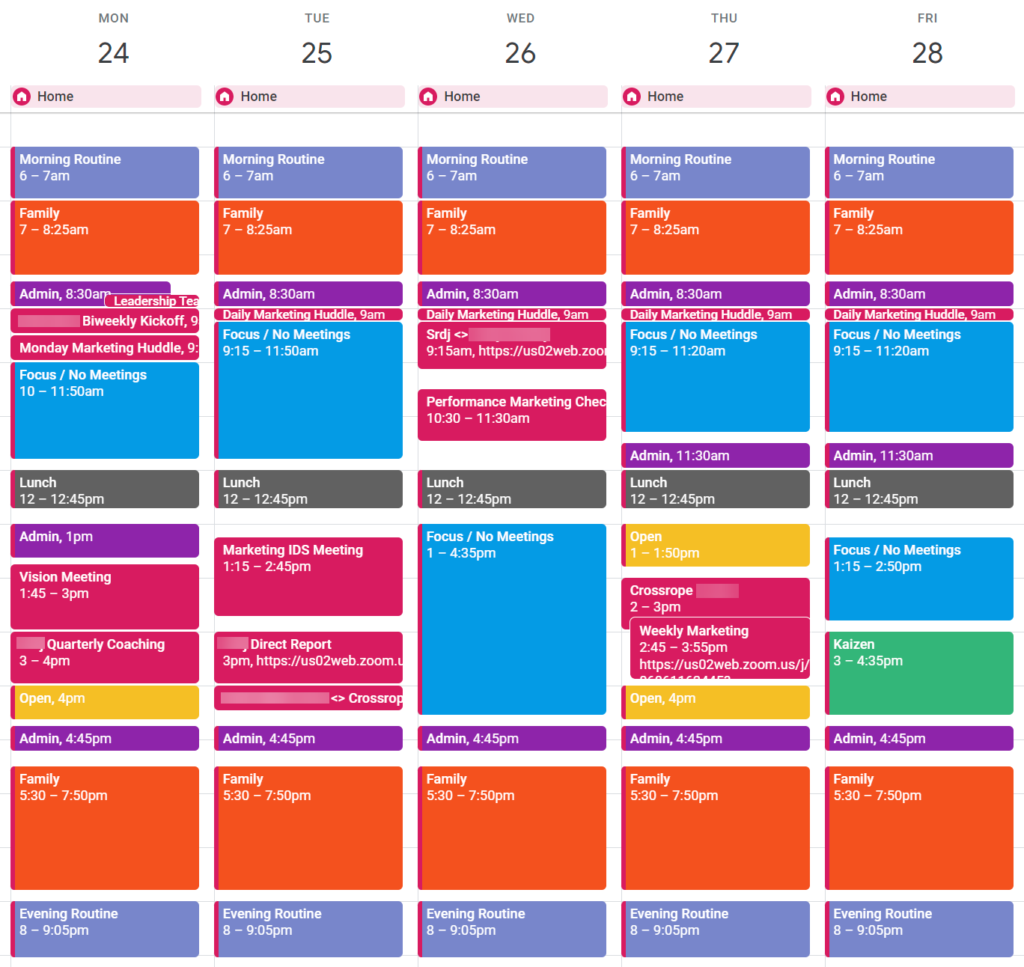I like to think of time blocking as the core of any productivity system. It’s almost impossible to operate effectively without it.
But for anyone who’s tried time blocking, you know it’s never that easy.
Sure, scheduling blocks of time in your calendar is simple, but sticking to the plan is tough. A 90 minute block of time carved out for deep work can easily get derailed with an impromptu call request or series of ’emergency’ pings 🔔 🔔.
Here’s the deal: you can block off all the time you want, but if you’re not using your blocks for their intended purpose, you’ll get nowhere.
Today I want to share some simple but effective time blocking tips I’ve learned from my (many) years of time blocking.
Let’s begin.
1 – Pay Yourself First
In personal finance, there’s this thing called paying yourself first 💰.
When you pay yourself first, it means the very first thing you do when you get your paycheck is put a portion of it into your savings account (often automated). You do that before you spend your money on anything else. When you pay yourself first, you are prioritizing for the future.
The same idea applies with your time.
When you pay yourself first with time, you are actively securing time for yourself in the future before anyone else can claim it.
What you need to do: look ahead in your calendar and schedule your focus blocks, admin blocks, Kaizen blocks, open blocks, and rest blocks for at least 3-4 weeks ahead. I aim to stay at least a month ahead (recurring helps, see tip #5).
Here’s where the magic happens: as the weeks pass by and others want to schedule calls and meeting requests with you, they will have to schedule around your blocks instead of the other way around.
That’s the beauty of paying yourself first.
2 – Protect Your Blocks
This is where I see most founders and marketers struggle.
We do a great job carving out blocks of time for deep focus work, but all plans get derailed when urgent things come up throughout the week. Others ask you to join a last minute meeting, someone will pass a new “urgent” task, etc. Suddenly we feel compelled to replace our important work with someone else’s.
Working better starts with learning how to protect the time you’ve prioritized for yourself.
“You must guard your deep work blocks like a hawk.”
Eden Bidani (interview)
Fact: people will try to take your focus blocks away from you. While you need to stay flexible for emergencies and urgent matters, you don’t want to get into the habit of breaking your focus blocks every time a new issue or project arises.
Here are some basic guidelines for protecting your blocks:
- Communicate to your team the importance of your scheduled (focus) blocks and remind them try to work around those,
- Put guardrails up against distractions (see #3),
- Schedule ‘open’ blocks to act as buffer room for impromptu items (see #4).
Learn how to protect your time at all costs.
3 – Be Mindful of Distractions
As you’ve likely experienced, distractions can very easily and quickly derail even the most well intentioned day.
A Slack notification, phone call, text, your roommate blending a smoothie, or just a persistent thought popping up in your mind – all of these can hijack your time and erode your important blocks of time.
“Research shows it takes an average of 23 minutes to regain focus after a distraction because different parts of your brain are activated every time you switch between tasks.” 😬
Source: The Cost of Interrupted Work
As remote and hybrid work continue to evolve, learning how to manage the growing number of distractions around you will be more important than ever.
What you need to do: read my tips on how to protect yourself from both internal and external distractions and put the right guardrails in place.
4 – Leave Buffer Room
Another big mistake I see people make is they fill their calendar to the brim with focus blocks and back to back meetings. There’s literally no room to breathe.
What typically happens in these situations is as soon as one block gets broken, all the dominos come down. Today’s workweek is too unpredictable to try to plan things perfectly. Instead, you’re better off leaving a sufficient amount of buffer room to take care of things that come up throughout the week.
Apart from ensuring I don’t have more on my plate than I can handle for the week (takes time to master), one effective way to leave buffer room is to schedule ‘open’ blocks in your calendar. You can see mine in yellow below.

Open blocks are flexible blocks of time that have no pre-set agenda. If there’s an impromptu call or emergency to take care of, I’ll use an open block. But if nothing comes up, I simply change the open block to a focus or admin block. It’s a simple, flexible block of time that works great for random things that come up.
But what if there are no open blocks available? That happens.
In those cases, it’s important to know which blocks you’re OK to sacrifice and which ones you’re not. For me, family and focus blocks are at the very top of my priority list so I’ll do anything I can to protect those. Admin blocks, on the other hand, are less important so I’ll use an admin block as extra buffer when needed.
Finally, one little thing you can do to add some breathing room to your calendar if you’ve got lots of back-to-back calls is enable ‘speedy meetings’ in your calendar. Simply go into your Google calendar, jump into settings, and in the Event settings section turn on ‘Speedy meetings’.

This will now automatically turn any 30 minute meeting into a 25 minute meeting or a 60 minute meeting into a 50 minute meeting to automatically add some buffer room to your day. It’s worth testing.
However you want to do it, make sure to always leave some buffer room when you’re time blocking your week.
5 – Automate Your Time Blocks
In the world of better work, automation is essential.
Time blocking a full week can take time. The easiest way to speed up time blocking is to schedule recurring blocks of time. For example, my Thursday and Friday morning focus blocks are set to repeat at the same time every week.

The value of automating my time blocking is more than just about making my weekly planning more efficient (it saves a lot of time). It also does the following:
- It makes it easier to pay myself first (read tip #1) – when I set recurring focus blocks weeks or months ahead, I’m securing time for my important work before other people’s priorities start coming through.
- It allows me to establish a weekly routine – I operate best when I have a well structured routine so I prefer having my focus blocks for deep work at (roughly) the same time every week.
Save yourself time with recurring blocks of time.
Final Quick Tips
I told myself I’d keep this list to five time blocking tips but I can’t round it out without adding a couple more tips I think you’ll find helpful.
- Be mindful of your energy 📈📉 – when you’re scheduling your week, be mindful of how your energy levels ebb and flow throughout the day and week. We all have peaks and valleys and it’s important to plan out our days accordingly. My energy peaks in the mornings which is why most of my deep focus blocks are scheduled in the mornings. Read more about energy levels here.
- Use color coding in your calendar 🟩🟦 – you probably noticed above that I use different colors for different block categories in my calendar. As you get accustomed to your colors, this is a great way to visualize your week. If I see too much red in my calendar, it means I’m over indexed on calls and meetings and need to make some adjustments.
Wrapping it up
If done right, time blocking can be a real productivity weapon. The key is staying disciplined. If you’re not using your blocks as planned, you’re wasting your time.
The last thing I’ll leave you with: don’t try to be perfect. Time blocking doesn’t work that way. You need to maintain a level of flexibility and humility and be ready to change plans as you go. The truth is, you’ll still get distracted by new shiny objects, focus blocks will go underutilized, urgent calls will derail your deep work plans, and you’ll get taken away from your most important work.
But that’s part of the game we play. Good luck!
✌

